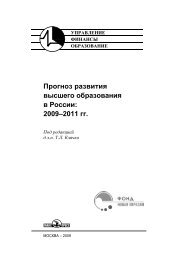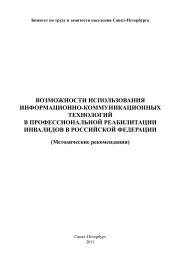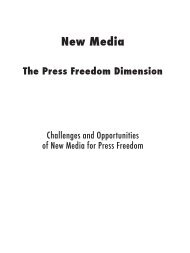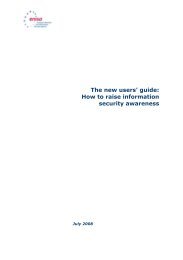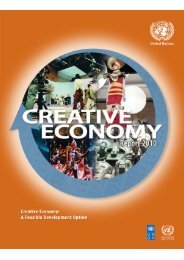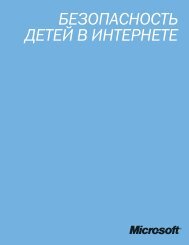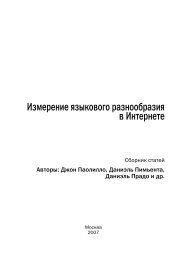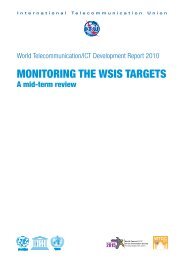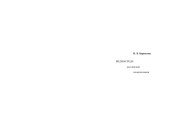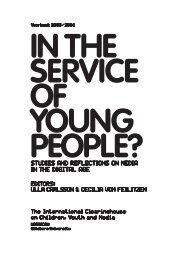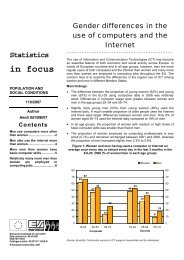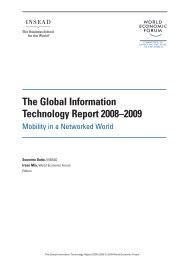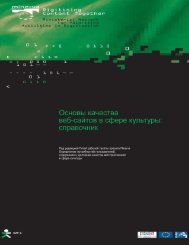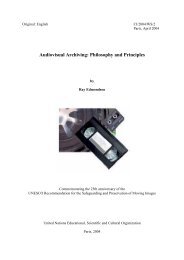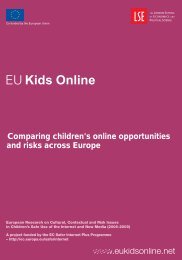Model curricula for journalism education for developing countries ...
Model curricula for journalism education for developing countries ...
Model curricula for journalism education for developing countries ...
You also want an ePaper? Increase the reach of your titles
YUMPU automatically turns print PDFs into web optimized ePapers that Google loves.
104<br />
statistic of the evolution of one of the social issues addressed (poverty,<br />
unemployment, etc.) Reading <strong>for</strong> week 12: Jenkins and Thorburn (2003), Yantek and<br />
Harper (2003), and De Burgh (2005).<br />
Week 12<br />
Lecture: The media. The media as an influential political actor. Politics with and<br />
without media. The media as an institution-building actor and as an institutionthreat<br />
actor. Media and democracy. Seminar: discussion of the texts required.<br />
Reading <strong>for</strong> week 13: Jenkins and Thorburn (2003), Priess (2002), Yantek and Harper<br />
(2003), and De Burgh (2005).<br />
Week 13<br />
Lecture: The public-private ownership debate. Multimedia and mergers. Freedom<br />
of speech and the new challenges. State and private censorships. Regulations.<br />
Restrictions on access to public in<strong>for</strong>mation. State advertising as a tool of pressure.<br />
Politicians as owners of media. Seminar: analysis of some NGOs’ comparative index<br />
of worldwide freedom of speech (International Press Institute’s Annual Press Review,<br />
the Committee to Protect Journalists’ annual review, Reporters Sans Frontiers’<br />
Annual Press Freedom Index). Assignment: written report with comparative critical<br />
analysis of the indexes discussed in the seminar. Reading <strong>for</strong> week 14: Jenkins and<br />
Thorburn (2003), Freedom House (2006), Ghunter and Mughan (2000), and De Burgh<br />
(2005).<br />
Week 14<br />
Lecture: The media in a political environment. Credibility and impact. Objectivity and<br />
subjectivity. Political manipulation. A journalist caught in a set of pressures. Telling<br />
“the truth” or telling “what people wish to hear”. Seminar: discussion of the texts<br />
required.<br />
Week 15<br />
Seminar and workshop: Oral presentation and discussion of the second special<br />
report on one of the main political, economic or social issues and policies discussed<br />
during the course. Reading <strong>for</strong> week 16: Lavrakas and Traugott (2000) and<br />
Armstrong (2004).<br />
Week 16<br />
Lecture: Public opinion. Public opinion as a decisive political actor in a democratic<br />
system. Measuring public opinion tendencies: purposes, types and usefulness of<br />
opinion polls. Manipulating public opinion: same numbers, different outcomes.<br />
Seminar: discussion of traditional voting behavior: district, socio-economic class,<br />
age and gender as determinants of political patterns. Assignment: written report



